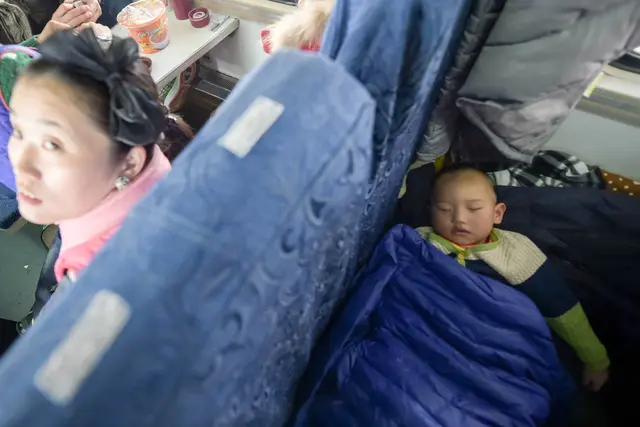Xu Shan abandoned her plans to fly home for the Chinese Lunar New Year after two weeks of deliberation.
It will be her third New Year holiday spent alone, 1,970 miles away from home.
"It's not that I don't miss my parents, but the long journey home is far too tiring and costly," said Xu, a white-collar worker at a training company in Fuzhou, capital of east China's Fujian Province.
To travel back to her hometown in Daqing, an oil rich city in northeast China's Heilongjiang Province, she will have to get up at 5 a.m. to catch a flight to Beijing for a two hour stopover before flying on to Daqing.
It will be dark when she arrives at the bus terminal in Daqing and the last bus to her home county 50 miles away will have long left.
If she does not want to stay in a hotel, she will have to wait for a cab in freezing minus 30 degree Celsius temperatures and get home around midnight, too exhausted to utter a word of greeting.
"It's even more discouraging to think that I'll have to repeat the schedule in six days at most, because I will be back to work on the seventh day of the lunar new year."
Xu secretly planned to postpone her homecoming trip to March, when plane tickets are cheaper, but she is not certain whether her boss will grant her leave when everyone else in the company is busy.
The massive getaway for the Chinese New Year, a period that lasts around 40 days before and after the holiday, is a big event for everyone in the country. This year, the Chinese are expected to make 2.91 billion passenger trips across the country.
China has the world's largest railway network, with 19,000 km of high-speed railways in operation by the end of last year, but traveling is still a struggle for many.
Wang Yatong, a 26-year-old power station employee in Fujian's Nanping city, has chosen to stay at work during the Chinese New Year. He said it would be "a waste of time" to travel home to Pingdingshan in central China's Henan Province.
His journey home would consist an eight-hour train ride plus two bumpy, congested trips on long-distance buses.Wang Hong, a native of Henan Province working in the southern province of Guangdong, was an early bird and good planner: he booked a train ticket for the New Year trip home almost two months in advance, but two days before he was scheduled to leave, his boss sent him to Beijing for a meeting. The train ticket was wasted and he had to spend three times as much money to fly home from Beijing.
In comparison, Old Su's homecoming trip is more flexible. Su, 45, is one of at least 400,000 motorcyclists who travel from Guangdong to their hometowns in the neighboring provincial regions on two wheels.
Su's trip home to Guangxi Zhuang Autonomous Region is at least 621 miles and took him 37 hours this year.
He, too, struggled before the homecoming trip. "I might have failed to make it," he said.
A truck driver for a small furniture plant in Foshan City, Su was unable to collect his wages for the past three months until last Friday.
Su's boss owed him more than 7,000 yuan (1,066 U.S. dollars), an amount he needed desperately to cover his wife's medical expenses, who was suffering from anemia and gall-stones.
He made repeated phone calls to the boss pleading for his wages, but to no avail. He sought help from Xinhua reporters, who reported his troubles to the local government. With the government's intervention, the boss paid him 5,000 yuan, and promised to pay the rest of his wages after the holiday.
Su readily accepted. "The boss is having a hard time, too. Business was bad and he was not making money. Three times last year, the landlord cut electricity because the boss was unable to pay the bills."
Su thought he was lucky to get paid and even hummed a tune when he got packed and jumped on his second-hand Yamaha.
His son, 18, refused to ride with him, knowing Xinhua reporters would accompany him throughout the trip.
"He thinks it's a shame to be poor and fears people might recognize us if we appear in newspaper or TV news," said Su.
His ride home was bumpy and dangerous. To save time and money, he left at 5 a.m. Saturday and rode continuously for nearly 20 hours before a few hour's stay at an inn motel for 80 yuan.
He arrived home in a landlocked village of Guangxi's Daxin County Sunday evening, exactly a week before the New Year's Eve.
Su said he has two dreams in his life: to drive a motor vehicle and to build a new house. "My first dream has come true, but a new house is still far away."
To build a new house, even in his impoverished village, costs at least 100,000 yuan, an astronomical amount for Su and his wife, who have very little savings.
"But dreams make our lives worth living, right?"
 简体中文
简体中文

